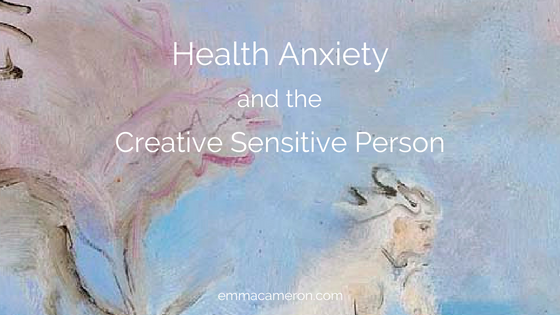
Health anxiety can have quite an impact on the creative, sensitive person
Health anxiety: Continual worries that there could be something seriously wrong with you, or that you are about to develop a serious disease (despite reassurances from doctors); or a lifetime of endless varied ailments, many of which are ‘medically unexplained’. Feeling worried about health more than other people seem to be.
Health anxiety may be limited to a specific time(s) in your life; or you may feel like it’s been hanging over you practically forever.
As a creative sensitive person, you’re probably blessed with a very inventive imagination, that allows you to go into ever-more compelling detail about ‘what could happen’. Added to which, you likely have an enhanced sensitivity to sensory cues such as discomfort and pain. And your inbuilt tendency for deep processing (see my page on the Highly Sensitive Person for more on what this means) can tip over into rumination (the unhealthy form of overthinking) which can lead you into ever-decreasing circles of alarming ‘what if’ thoughts.

Acknowledgements
I would like to gratefully thank my wise and experienced AEDP colleagues and mentors, who shared their perceptive and insightful thoughts on the issue of health anxiety. In this blog post I have included many of the points originally made by them. They include Elana Angus MSW RSW RCC, Eileen Russell Ph.D., Andrea Levin LCSW; Matt Fried, Ph.D., NYC; Meira Cohen Hansford, LCSW, and others.
What is health anxiety?
First, let’s be clear: everyone gets anxious or worried about health sometimes. That’s totally normal.
For example: You have a symptom that’s bugging you. You consider whether it’s something you should consult a health professional about. It might even occur to you that something sinister might possibly be underlying it.
Or: Someone you know has recently suffered a health crisis. You begin to wonder if something like that could be in store for you, too.
There’s a positive side to this. These health-related anxieties can nudge you into taking action on your own behalf: consulting a doctor, or changing something about your lifestyle (like getting more exercise, or quitting smoking). So in this sense, a moderate amount of health anxiety can be your ally.

When health anxiety takes over
But health anxiety can tip over into a more problematic form. You might get preoccupied, over an extended period of time, with worrying about illness and/or death. Perhaps you develop a compelling fear that a particular, somewhat routine ache and pain means something significantly greater and more threatening.
Sensibly, you consult a medical professional, who after examining you and perhaps testing for certain conditions, assures you that there’s nothing to be too concerned about.
But what if, instead of the anxiety gradually fading away naturally as other things in life arise to take your attention, it just becomes stronger and more insistent?
Your loved ones may start ignoring your worries; they may even call you a hypochondriac. Which only makes you feel more alone, and more anxious.

Your health anxiety is particular to you
The number one most important thing to stress, in talking about health anxiety, is that there is no ‘one size fits all’. You are unique. I am neither your doctor, nor your psychotherapist, so I am not the person to definitively advise you about you.
Anyone who claims to be the expert on your health anxiety, should be treated with caution, particularly if they haven’t first spent a lot of time getting to know you in depth and trying to understand what makes you tick (both physically and mentally).
I’m just going to lay out a few varied thoughts on the subject of health anxiety, for you to wonder about. Some of these thoughts may fit you; others won’t. Ponder, pick and choose whether any seem to align with your own situation.

The three strands to health anxiety
Very often, health anxiety is a mixture of three interwoven factors:
- Physical discomfort/ pain/ symptoms
- Immense energy and worry toward a ‘what if’ scenario (e.g. ‘what if it’s cancer’/ ‘what if I become bedridden’)
- Judgement, feelings and thoughts towards yourself for not being in control of your health or your thoughts & feelings
All of those three strands have one thing in common: Distress. It’s really distressing to suffer from health anxiety, and this applies whether you have a serious medical condition or not.
Even if your health anxiety turns out to be a smokescreen, distracting you from something else, the distress you experience is real and needs to be heard and understood (by yourself and by at least one trusted other person) before it can heal and transform.

Here are some thoughts about health anxiety:
Anxiety comes in many different forms
Anxiety is a funny thing. It can seem to float around and attach itself to pretty much anything! Health is just one.
Here are a few examples:
- fears about losing loved ones
- worries about money
- fears of embarrassing yourself in public
- fears about being in a crowded space
- fears that you’ll say or do something unacceptable or taboo
- phobia of certain objects, animals, etc
- obsessive/compulsive disorder
…and there are so many more.
So why would we tend to fixate on our health, as something to be anxious about? Well, your body is a fundamental part of your self. So it makes complete sense that when the anxiety in you seeks expression, it hooks onto something to do with your body and gets you worried about health or appearance (body dysmorphia would be another example of this).

Health anxiety exists on a spectrum
Health anxiety is part of a huge range of possibilities for anxiety, and like other anxieties, being worried about health exists on a spectrum. All of us have a capacity for mild or occasional health anxiety; many of us find it can get a bit overpowering occasionally (especially around the time of a new diagnosis or other trigger); and for some people health anxiety can even become quite crippling, preventing them being present in their daily lives.

The body and the mind are not separate
In Western thinking, we’ve long held the view that the body and the mind are two completely separate aspects of ourselves. Contemporary science is now showing us how false that view is.
We have neurons and glia (kinds of brain cells) in many parts of our bodies, not only in the skull-based brain. They can be found in particularly high concentrations in the gut and around the heart. In a sense, the brain is in the body, below the neck as well as above!
And anyone who has experienced the phenomenon of (for example) blushing, knows how intertwined our thoughts, feelings, and body are.
Our bodies can trigger thoughts, and our minds can produce physical sensations. Aches and pains (and other physical symptoms) can be created by mental processes, by physical processes, or (most often) by a combination of the two.
Anxiety can cause bodily sensations; and anxiety can also make any existing body sensations feel stronger and less tolerable.

Gaining knowledge can be empowering – if it doesn’t go too far
Do you pore over medical information found online, maybe even seeking out discussion forums and health gurus who could – you hope – provide answers to your puzzling or alarming symptoms?
A continual search for ‘answers’ in the form of definitive knowledge (such as looking up diagnoses, medical information etc) can be a way of trying to help yourself feel safe and secure when life feels chaotic or unstable.
Arming yourself with knowledge can be very empowering, and can be a useful part of being a good ‘inner parent’ to yourself. Psychotherapist Andrea Levin LCSW describes her own experience delightfully:
At age 6, I was the best informed hypochondriac on the block, reading the Merck Manual cover to cover. Dad kept hiding it, I kept finding it. (Much as I loved the full spectrum of human malady, I found my focus in ‘appendicitis’. Keepin’ it simple!) Anxious focus on the body and rumination on ‘what’s wrong with me?’ — was a way to self-regulate, and create a sense of safety and control – being my own ‘wise doctor’. My ‘wise doctor’ part is still very important to me.
However as with many things, it’s possible for it to tip over into something rather less helpful. As science keeps evolving, there is no end to new discoveries and theories, many of which contradict previously held knowledge. This can lead to more anxiety and a deeper sense of uncertainty.

Unprocessed feelings often show up in the body
When certain feelings are ‘unacceptable’ (either just to yourself or to those around you as well) they may show up in the form of physical symptoms. For example, it’s not uncommon for unprocessed anger to find an outlet in back pain or headaches. Other ‘unacceptable’ feelings might include sadness, disgust, excitement, sexual excitement, etc.
Sometimes a certain set of symptoms can be traced back to a particular traumatic event or relationship.

‘Attention-seeking’ needn’t be bad
People with health anxieties are sometimes told that they are ‘attention-seeking’. Those who say this seem to think that giving or seeking attention is a bad thing. But what if we drop the judgement and recognise that all humans need attention and connection – it’s just part of our biological wiring.
Did you grow up in a family (or other environment, such as boarding school) in which your normal healthy needs for emotional connection and attention to your whole person were not sufficiently met?
If so, then you may have unconsciously learned that physical symptoms are a way you can feel attended to and seen. It may feel that when the distress in your body is being attended to, your emotional needs are getting a little bit of the deeper caregiving that you crave.
The sad fact however, is that no amount of attention to physical ailments can really provide the emotionally attuned nurturing and empathy that we all need.

Health anxiety can be a smokescreen
Health anxiety can function as a smokescreen, distracting you and those around you from another problem in your life, such as a violent partner or some other kind of abuse. This almost always happens unintentionally – you don’t consciously plan this, and it may be outside of your awareness.

The language of physical ailments may be the only language that’s understood and spoken
Many sufferers from health anxiety have ‘alexithymia’, a difficulty in finding words to describe emotions. It may be that you grew up learning to speak about concrete things such as physical aches and pains, but no-one was able to teach you the language needed to describe emotions and the finer nuances of your feelings. No-one may have been able to listen carefully to you when you tried to put into words what you were experiencing.
When you lack vocabulary to accurately describe something, it powerfully affects how you are able to think about it. It also limits how you can express yourself to others. This can be a problem because we humans have a strong inbuilt need to communicate our experience to one another.
So you may have learned all sorts of ways of talking about physical pain, medical treatment and health matters, but be unable to put your shifting emotional experience into words (or even conscious thoughts).

Speaking your truth – with support – can help
In a family where being physically injured or sick is allowed, but expressing feelings that disturb others is not, being sick can give a child some sort of space to express that something is wrong and receive support. A child may develop health anxiety in this situation, where their true thoughts and feelings (such as “Hey everyone, there is a violent narcissist in our family! We are all pretending it’s not happening and I’m getting hurt a lot!”) have to be suppressed and hidden.
Speaking the truth to the family can be a difficult decision that seriously rocks the boat and receives mixed reception, but can allow you to speak the real problem, and and may resolve the health anxiety. Getting to this point may take a long time, a lot of work in therapy, and a lot of relationship-building to get to a place safe enough that you can let go of this coping strategy.

Your early experiences may underpin your feeling that your body is unreliable
When you have an anxious, uneasy relationship with your body, and experience your body as ‘unreliable’, it could be an expression of unprocessed early life experiences of being dependent on someone who wasn’t available to be completely relied upon. This may have been the case if your parent (or whoever was in the parental role) was affected by alcohol/substances, trauma, domestic abuse, poverty, oppression, their own health challenges, depression, etc.

When health anxiety becomes a relationship
Sometimes, health anxiety may take over your life to such an extent that it almost becomes a relationship in itself (albeit an unpleasant and unwanted one), blocking you from finding ways to connect with and relate to other people. This is particularly likely if you were in a traumatic relationship in your early life (perhaps you were cared for by a parent who was frightening or frightened themselves).

Anxiety loves the illusion of control
Most of us, when we feel anxious, seek to control something. This is what’s at the root of eating disorders such as anorexia and orthorexia (obsession with ‘clean’ eating), the rituals and routines often involved in OCD, and many phobias. Health anxiety, too, often seeks to use control as a solution.
On some level we recognise how little power and influence we truly have in life, we feel (understandably) petrified at this, and so we seek to create a sense of safety through restricting and channelling our fears into something that can be labelled and, we hope, dealt with by finding treatment.

Is it all my own fault?
Many people with health anxiety torture themselves with guilt and shame for ‘not having looked after themselves well enough’. They may believe that any illness they develop is bound to be self-inflicted.
They may even feel that it would be a relief to develop a feared illness, because unconsciously they feel the need for punishment.
This kind of guilt and shame, with its themes of punishment and control, may be best addressed and worked through in an attachment-based relational psychotherapy.
Some people also go through painful cycles of food restriction and/or excessive exercising, as a kind of punishment-release cycle.
In fact, although eating healthily and getting exercise does matter, studies have shown that we overestimate the extent to which personal choices like these can affect an individual’s health. Far bigger influences include chance, genetics, stigma, oppression (eg suffering frequent micro aggressions such as racism, classism, sizeism, etc), age, environmental factors, and poverty (for statistics and more details on the scientific research, read ‘Body Respect’ by Linda Bacon and Lucy Aphramor).

Sometimes something is wrong, but it hasn’t been diagnosed yet
Whether it’s an environmental toxin, a hormonal imbalance, a faulty gene, an undiscovered infection, or a deficiency of good gut bacteria, there are all sorts of physical factors that could be contributing to a sense of ‘something’s not right with my body’. The right diagnosis and physical treatment can make all the difference.
For those individuals that this applies to, it can be so relieving and freeing to get an accurate diagnosis from a medical professional. Finally there’s a chance to feel seen, understood and taken seriously. And there are usually pointers as to what treatment to pursue.
However, please remember that just because you fear a particular disease or condition, does not necessarily mean you must have it! It’s very common to be convinced that you’ve got something terrible, when in fact you are physically healthy and well (or have something that is mild and easily treatable). Feelings (such as fear) need to be respected and understood, but remember they are just feelings, not facts.

Health anxiety sometimes stems from medical procedures which felt traumatic
Some standard medical procedures can be quite traumatic in themselves (for example, lumbar punctures, MRI scans, injections, operations etc). Many people (particularly those who had to undergo procedures as children) can be left with a degree of post-traumatic stress. This can come out in various ways, one of which may be increased health anxiety later in life.

Health anxiety has its uses!
Whether it’s trying to flag up something important, keep you safe, get help, manage overwhelming feelings or situations, or protect you from having to face something more difficult, health anxiety always has a function (or at least, it will have done when it first developed).
Often, though, there are other, better ways of achieving whatever the health anxiety is trying to achieve. Psychotherapy can be a really good way of working through this, and helping you reach a state where you can feel better and more free to live the way you choose.
When the feelings health anxiety protects you from are good feelings
For some people, their health anxiety helps protect them from feeling good. (And yes, I did mean to write ‘protect’ and not ‘prevent’!) Many of us grew up with an unconscious feeling of ‘I mustn’t feel good’ (perhaps because of a sense that this means a disastrous fall is about to happen; or perhaps because we grew up with a depressed or troubled parent, and it felt like feeling good was somehow abandoning our parent).
Having a constant sense of dread or anxiety about your health can be a very effective way of avoiding those pesky good feelings! Even though that’s probably the opposite of what the person consciously wants.

What can help?
If you are trying to calm and soothe your health anxiety, several things can be helpful.
Mindfulness
One is learning and practising mindfulness. There are many places to start, such as videos on YouTube, apps, books, and of course local mindfulness and meditation classes and teachers. I’ve listed some resources below.
Self-Help
A good general book to start with is Rick Hanson’s ‘Resilient: Find Your Inner Strength’, which has many tips and strategies you can use to help you feel more grounded and less shaky inside (You might start by dipping into chapter 7: Calm).
Russ Harris’s books are also very useful. They are based on the principles underlying ACT (Acceptance and Commitment Therapy) which has a very good track record in working with people who suffer from somatic (body) complaints and chronic health conditions, as well as people who are physically well but who suffer from anxiety and/or depression.
Another book I highly recommend if you’re trying to get better at identifying, expressing and understanding your authentic feelings, is ‘It’s Not Always Depression’ by Hilary Jacobs Hendel.
Self-Compassion
It’s important to be kind to yourself. Whether your illness is real or imagined, your anxiety is a cause of suffering. And no matter what underlies your physical symptoms, you still deserve compassion and care. For more information on how to practise self-compassion, check out the books listed above, or watch a video talk from Kristin Neff.
Holistic Medicine
If you are certain there is something physical underlying your symptoms and feel you have gone as far as you can with the medical services you have been able to access so far, consulting with a Functional Medicine practitioner who has a holistic perspective might be helpful. Psychotherapist Eileen Russell PhD. explains:
“As a psychologist I have been humbled to learn that what we may tend to analyze or “psychologize” can also be literally a manifestation of biochemical imbalances, sensitivities, “allergies,” etc. Sometimes people are anxious that something “is wrong” with them because perhaps something is and no one in their lives has yet figured it out (or maybe are not sufficiently curious about it). The enteric nervous system of the gut has more serotonin than
the brain. When people cannot break down certain foods, substances, or toxins, the imbalances here can lead to anxiety and depression. Unfortunately, most western medical doctors don’t work at this level and most psychiatrists just medicate”.
A fully qualified doctor who has an orthodox Western medical training alongside an integrated knowledge and expertise in other forms of medicine may be able to support you in accessing the right diagnosis and treatment. Or they may be able to reassure you that your difficulties stem from psychological roots which can be treated with psychotherapy.
Psychotherapy
With the right therapist, you may be able to get to the bottom of what’s going on for you, and make changes so you feel differently. This can be profoundly helpful, whether or not you also have physical stuff (such as a chronic illness) going on.
Amongst other things, you and your therapist can:
- Find ways to have a conversation with the part of you that needs to worry, fear, and be on alert
- Welcome and expand the part of you that longs for freedom from constant fear
- Develop your tolerance for anxiety and somatic (body) sensations
- Broaden and deepen your capacity to regulate your anxiety and make it more manageable
- Discover ways to talk about and express your authentic feelings
- Help you to feel heard at the deepest level
- Help you to connect with others and undo your aloneness
- Uncover and process the layers of distress that are implicated in your health anxiety
- Help heal the relationship between you and your body, when you feel your body has been untrustworthy or attacking
- Make sense of your individual history and experiences
The most important factor in choosing a therapist is finding someone who you like and you feel you can trust, and who has ‘done their own work’. The type of therapy they’re trained in can also make a big difference. For working with health anxiety, I’d particularly recommend a therapist trained in one of the following: AEDP (Accelerated Experiential Dynamic Psychotherapy), ISTDP (Intensive Short-Term Dynamic Psychotherapy), ACT (Acceptance and Commitment Therapy), EFT (Emotion Focused Therapy), Somatic Experiencing, Sensorimotor Psychotherapy or Integrative Arts Psychotherapy. (However there are also many psychotherapists and counsellors out there who have another training and are excellent at working with health anxiety). Health anxiety can also be a manifestation of OCD (Obsessive-Compulsive Disorder) so an OCD specialist may be able to help you.

Conclusion: Health anxiety can be a positive sign!
Please remember this: Your health anxiety comes from a very well-intentioned place.
As psychologist Matt Fried, Ph.D., NYC eloquently explains:
My emphasis with my clients who experience this kind of anxiety and preoccupation is that their worries are a valuable sign of their drive to live, to remain alive and to thrive rather than to suffer. Our bodies are self-regulating survival systems and able to signal when things are amiss. So I’m championing my clients’ drive towards life and vitality despite the truth of our vulnerability, fragility and built in mortality.
We all know the truth that all beings are vulnerable and fragile, and we are all mortal. And yet another truth is that the urge to live, to survive and to thrive is a gift and a powerful thrust embedded in the life force.
These truths are so awe-inspiring and beautiful, and beyond our human understanding. Whether through spirituality, or science, or a combination of the two, maybe you could view your health anxiety as an invitation to a deeper contemplation of the mysteries of life.

What has helped you with your health anxiety? And have any of the points raised in this blog post struck a chord for you? I’d love to read your thoughts in the comments below!

Resources:
‘Mindfulness for Health’ by Vidyamala Burch and Danny Penman
‘The Reality Slap’ and other books by Russ Harris (based on ACT – Acceptance and Commitment Therapy)
‘It’s Not Always Depression’ by Hilary Jacobs Hendel
Free videos and other resources from Russ Harris
‘How I learned to tame my hypochondria’ – Annalisa Barbieri in The Guardian
For Professionals:
‘Restoring Resilience: Discovering Your Clients’ Capacity for Healing’ by Eileen M. Russell, PhD.
‘The Heart of Trauma: Healing the Embodied Brain in the Context of Relationships’ by Bonnie Badenoch
All illustrations ©Emma Cameron 2015, 2018, 2022
Hi Emma, I love this. I have followed the health anxiety thread with interest and you have done great justice in synthesising the information here for non-therapists. It’s so powerful to imagine giving a client that powerful reframe of hearing their anxiety described as “the urge to live, to survive and to thrive”.
Thank you Sam. That wonderfully positive way of reframing health anxiety came from Matt Fried Ph.D., NYC, with his beautiful AEDP perspective. I thought it was so great to look at health anxiety in this way, as a manifestation of the urge for transformance and growth that we humans all have.
Great artcle, Emma. Thank you for writing about health anxiety. It’s so important and so very prevalent.
Thanks Hilary!